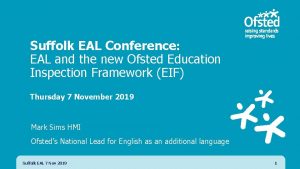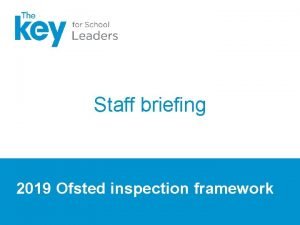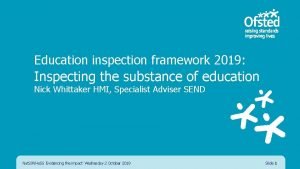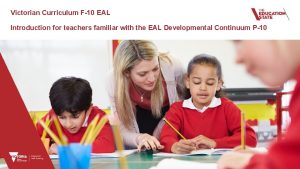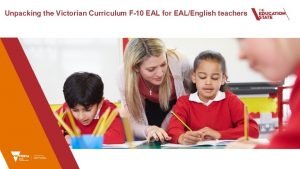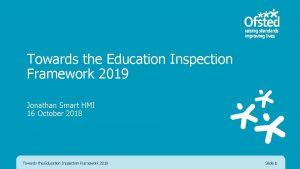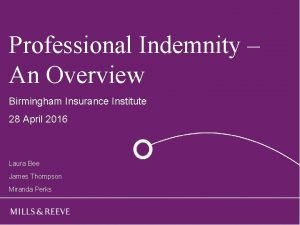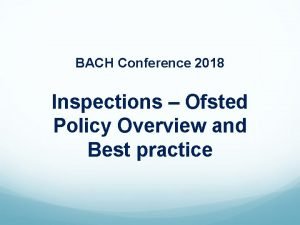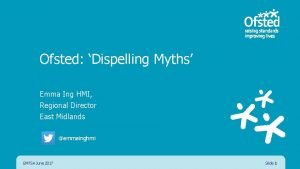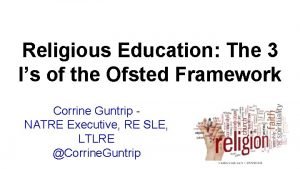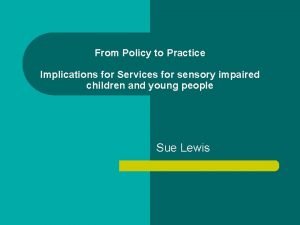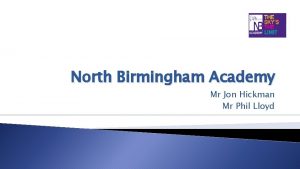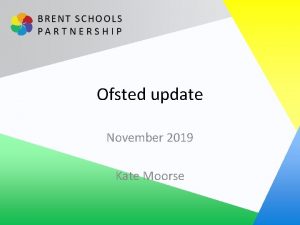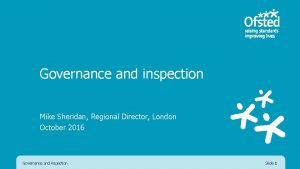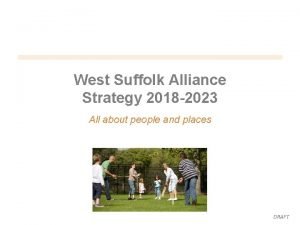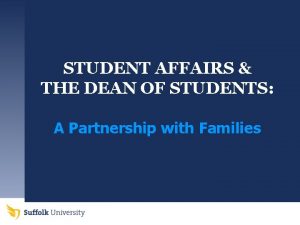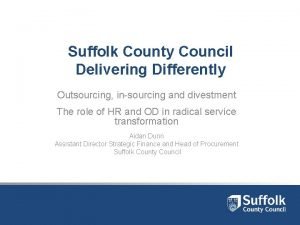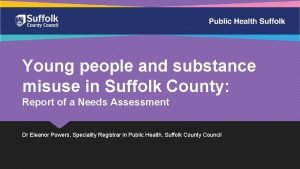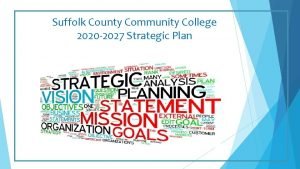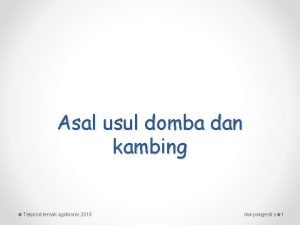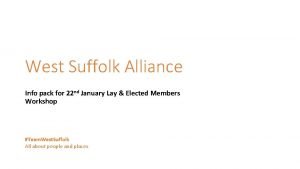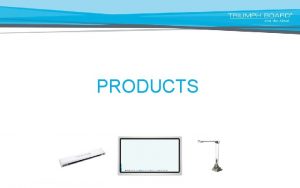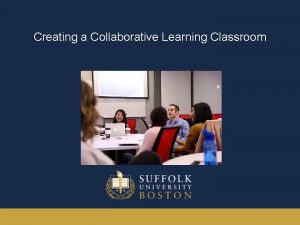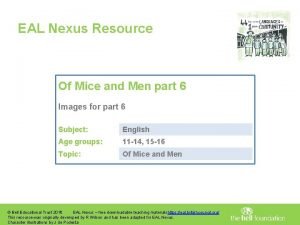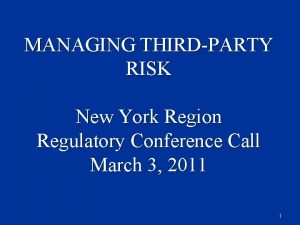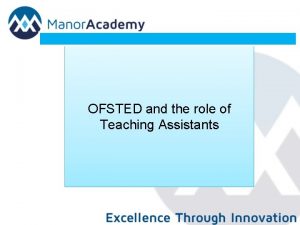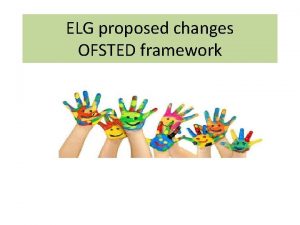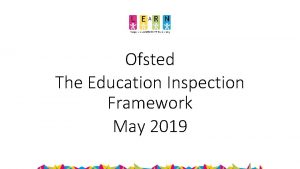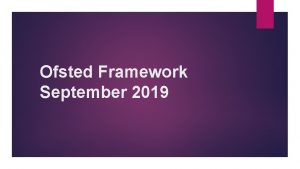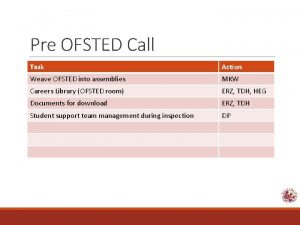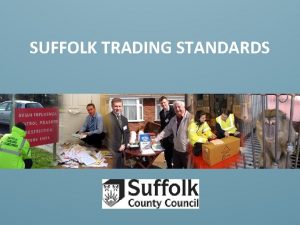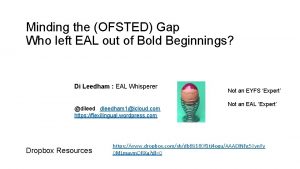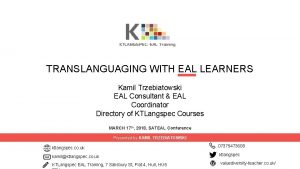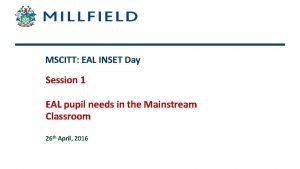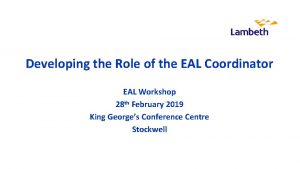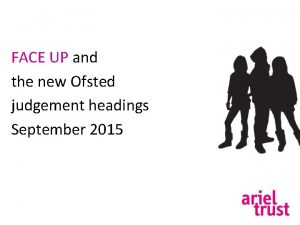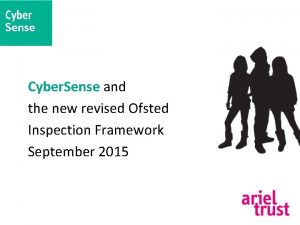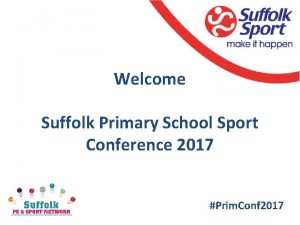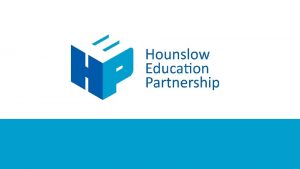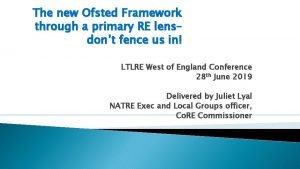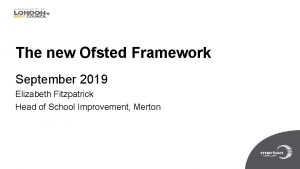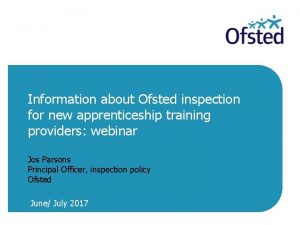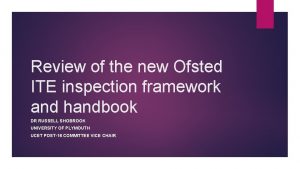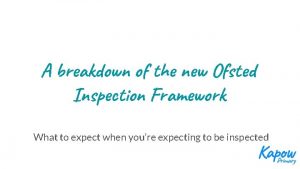Suffolk EAL Conference EAL and the new Ofsted


















![The importance of the curriculum ‘If [children’s] entire school experience has been designed to The importance of the curriculum ‘If [children’s] entire school experience has been designed to](https://slidetodoc.com/presentation_image/00f4e3910cfe4581b06c01fe5ceb693d/image-19.jpg)





















![References to equality in the EIF: Principles of inspection • [Inspection] is based on References to equality in the EIF: Principles of inspection • [Inspection] is based on](https://slidetodoc.com/presentation_image/00f4e3910cfe4581b06c01fe5ceb693d/image-41.jpg)














- Slides: 55

Suffolk EAL Conference: EAL and the new Ofsted Education Inspection Framework (EIF) Thursday 7 November 2019 Mark Sims HMI Ofsted’s National Lead for English as an additional language Suffolk EAL 7 Nov 2019 1

Aim § This presentation will review the final version of the new Ofsted Education Inspection Framework and handbook which were introduced in September 2019 and highlight where there are implications for inspectors and schools concerning pupils for whom English is an additional language. Suffolk EAL 7 Nov 2019 2

Objectives § Setting the historical context for inspecting EAL § The thinking behind the new approach to inspecting the curriculum – the case for change § The inspection judgements in the new framework § The use of data § Pupil groups in the new framework § The methodology of inspection Suffolk EAL 7 Nov 2019 3

Historical context: Ofsted and EAL § Published guidance for inspecting EAL up to 2012 – went on the “bonfire of guidance” – left with three documents only: common inspection framework; school inspection handbook; safeguarding guidance § EAL good practice surveys until 2015 – ended with Ofsted’s “no preferred style” for teaching and assessment. Suffolk EAL 7 Nov 2019 4

Ofsted’s position: previous school inspection handbook (section 5) up to July 2018 Inspectors must not advocate a particular method of planning, teaching or assessment. It is up to schools themselves to determine their practices and for leadership teams to justify these on their own merits rather than by reference to this inspection handbook. (Pages 12/13; Paragraph 31) Suffolk EAL 7 Nov 2019 5

Pupil groups referred to in the previous school inspection handbook: Outcomes for pupils Disadvantaged pupils The most able Lower-attaining pupils Pupils who have special educational needs and/or disabilities (Pages 58 -61) • • Suffolk EAL 7 Nov 2019 6

Groups of learners referred to in the previous inspection framework: In making judgements, inspectors will pay particular attention to the outcomes for the following groups: • children and learners for whom English is an additional language • children and learners from minority ethnic groups • Gypsy, Roma and Traveller children and learners (Pages 6/7) Suffolk EAL 7 Nov 2019 7

Education inspection framework 2019: inspecting the substance of education Slide 8 Suffolk EAL 7 Nov 2019

The case for change • Currently, the accountability system can divert schools from the real substance of education. • What young people learn is too often coming second to delivering performance data. • This data focus leads to unnecessary workload for teachers. • Teaching to the test and narrowing of the curriculum have the greatest negative effect on the most disadvantaged and the least able children. Slide 9 Suffolk EAL 7 Nov 2019

Curriculum Survey Phase 1 Suffolk EAL 7 Nov 2019 10

Curriculum Survey Findings Phase 1 (Autumn 2017) Suffolk EAL 7 Nov 2019 11

Hart, B. , & Risley, T. R. (1995). Meaningful differences in the everyday experience of young American children. Paul H Brookes Publishing. Suffolk EAL 7 Nov 2019 12

What’s in a word ? • Findings of the Hart and Risley landmark US study • Researchers recorded that in their first four years: • an average child in a professional family accumulated experience with almost 45 million words • an average child in a working-class family, 26 million words • an average child in a welfare family, 13 million words. Suffolk EAL 7 Nov 2019 13

Suffolk EAL 7 Nov 2019 14

Suffolk EAL 7 Nov 2019 15

The progress of EAL learners Suffolk EAL 7 Nov 2019 16

Conclusion Suffolk EAL 7 Nov 2019 17

‘A force for improvement through intelligent, responsible and focused inspection and regulation’ Ofsted strategy 2017– 22 The new framework • The curriculum at the heart of inspection. • No need to produce progress and attainment data ‘for Ofsted’, helping reduce unnecessary workload. • All pupils should have access to a high-quality education. Slide 18 Suffolk EAL 7 Nov 2019
![The importance of the curriculum If childrens entire school experience has been designed to The importance of the curriculum ‘If [children’s] entire school experience has been designed to](https://slidetodoc.com/presentation_image/00f4e3910cfe4581b06c01fe5ceb693d/image-19.jpg)
The importance of the curriculum ‘If [children’s] entire school experience has been designed to push them through mark-scheme hoops, rather than developing a deep body of knowledge, they will struggle in later study. ’ Amanda Spielman, at the launch of Ofsted’s Annual Report 2016/17 Slide 19 Suffolk EAL 7 Nov 2019

What is staying the same? • Inspectors will continue to make an overall effectiveness judgement. • On s 5 inspections, inspectors will continue to make judgements about early years and sixth form in schools where they exist. • Four-point grading scale (outstanding; good; RI; inadequate). • Section 8 inspections of good schools (currently called ‘shorts’) will continue to start from the assumption that the school remains good. Slide 20 Suffolk EAL 7 Nov 2019

EIF 2019 – proposed inspection judgements Overall effectiveness Behaviour and attitudes Quality of education Personal development Leadership and management Slide 21 Suffolk EAL 7 Nov 2019

Judgement areas: evolution, not revolution Overall effectiveness Teaching, learning and assessment Quality of education Outcomes Behaviour and attitudes Personal development, behaviour and welfare Personal development Leadership and management Slide 22 Suffolk EAL 7 Nov 2019

The judgement areas: quality of education Slide 23 Suffolk EAL 7 Nov 2019

The curriculum is at the heart of the proposed new framework: Ofsted’s working definition… Quality of education • ‘The curriculum is a framework for setting out the aims of a programme of education, including the knowledge and skills to be gained at each stage (intent) • for translating that framework over time into a structure and narrative, within an institutional context (implementation), and • for evaluating what knowledge and skills pupils have gained against expectations (impact/achievement). ’ Slide 24 Suffolk EAL 7 Nov 2019

A new ‘quality of education’ judgement Intent § Curriculum design, coverage and appropriateness Quality of education Implementation § Curriculum delivery § Teaching (pedagogy) – contribution to delivering the curriculum as intended § Assessment (formative and summative) Impact § Attainment and progress (including national tests and assessments) § Reading § Destinations Slide 25 Suffolk EAL 7 Nov 2019

The judgement areas: ‘leadership and management’ Slide 26 Suffolk EAL 7 Nov 2019

Judgements: Leadership and management § § § Vision, ethos and ethics Staff development Staff workload and well-being Off-rolling Governance/oversight Safeguarding Slide 27 Suffolk EAL 7 Nov 2019

The judgement areas: ‘personal development’ and ‘behaviour and attitudes’ Slide 28 Suffolk EAL 7 Nov 2019

Separate judgements for ‘personal development’ and ‘behaviour and attitudes’ Personal development, welfare and behaviour Personal development Behaviour and attitudes Slide 29 Suffolk EAL 7 Nov 2019

What we are doing in response § Introducing two new, separate judgements: ‘personal development’ and ‘behaviour and attitudes’. § Recognising the importance of pastoral care. § Revising the grade descriptors to address concerns around how bullying will be inspected. Slide 30 Suffolk EAL 7 Nov 2019

The use of non-statutory internal progress and attainment data Slide 31 Suffolk EAL 7 Nov 2019

‘Inspectors will not look at non-statutory internal progress and attainment data’ We proposed that inspectors will: § not look at schools’ internal progress and attainment data for current pupils § continue to have regard to published national data § focus on what is taught and how it contributes to the school’s intent. Slide 32 Suffolk EAL 7 Nov 2019

What we will do in response • We will proceed with inspectors not looking at non-statutory progress and attainment data. • Inspectors will ask what leaders understand about progress and attainment in the school, and will then say ‘let’s see that first-hand, together’. • Inspectors will consider the actions taken by schools in response to their understanding of progress and attainment, and the impact of these actions. Slide 33 Suffolk EAL 7 Nov 2019

Pupil groups in the new framework and handbook Slide 34 Suffolk EAL 7 Nov 2019

Reference to specific learners Leaders must have a clear and ambitious vision for providing high-quality, inclusive education and training to all. Suffolk EAL 7 Nov 2019 Slide 35

Special education needs and disabilities SEND considerations continue to be an important aspect of inspection. Feedback has helped to make this aspect stronger. Revisions made to inspection handbooks about what inspectors will take into account include: § remembering that pupils with SEND have varied starting points § taking into account complex vulnerabilities, which may mean additional safeguarding challenges § having high expectations when looking at the behaviour and attitudes of pupils with SEND § ensuring that we all have high expectations for pupils with SEND. Slide 36 Suffolk EAL 7 Nov 2019

Pupil groups referred to in the school inspection handbook • Inspectors will evaluate evidence of the impact of the curriculum, including on the most disadvantaged pupils. This includes pupils with SEND. It also includes pupils who meet the criteria for the school to receive pupil premium funding: pupils claiming free school meals at any point in the last six years, looked after children (children in local authority care) and/or children who left care through adoption or another formal route. 51 In addition, it includes children in need of help and protection, receiving statutory local authority support from a social worker. • (Page 24; Paragraph 86) Suffolk EAL 7 Nov 2019 37

Pupil groups referred to in Early Years in the school inspection handbook • the progress all children make in their learning and development relative to their starting points (Page 77; Paragraph 282) Suffolk EAL 7 Nov 2019 38

Pupil groups referred to in Early Years in the school inspection handbook : criteria for good • By the end of Reception, children achieve well, particularly those children with lower starting points (Page 81: Impact Bullet 2) Suffolk EAL 7 Nov 2019 39

Pupil groups referred to in the school inspection handbook • Inspectors will listen to several low-attaining pupils in Years 1 to 3 read from unseen books appropriate to their stage of progress (Page 87; Paragraph 297) Suffolk EAL 7 Nov 2019 40
![References to equality in the EIF Principles of inspection Inspection is based on References to equality in the EIF: Principles of inspection • [Inspection] is based on](https://slidetodoc.com/presentation_image/00f4e3910cfe4581b06c01fe5ceb693d/image-41.jpg)
References to equality in the EIF: Principles of inspection • [Inspection] is based on gathering a range of evidence that is evaluated against an inspection framework and takes full account of our policies and relevant legislation in areas such as safeguarding, equality and diversity. (Page 4; Paragraph 6) Suffolk EAL 7 Nov 2019 41

References to equality in the EIF: The Equality Act 2010 • Inspectors will assess the extent to which the provider complies with relevant legal duties as set out in the Equality Act 2010 and the Human Rights Act 1998. (Page 5; Paragraph 16) Suffolk EAL 7 Nov 2019 42

Groups of learners referred to in the EIF • leaders take on or construct a curriculum that is ambitious and designed to give all learners, particularly the most disadvantaged and those with special educational needs and/or disabilities (SEND) or high needs, the knowledge and cultural capital they need to succeed in life. (Page 9; Paragraph 26) Suffolk EAL 7 Nov 2019 43

Groups of learners referred to in the draft education inspection framework: quality of education – intent (page 11) • the provider has the same academic, technical or vocational ambitions for almost all learners. Where this is not practical – for example, for some learners with high levels of SEND – its curriculum is designed to be ambitious and to meet their needs. • (Page 9; Paragraph 26) Suffolk EAL 7 Nov 2019 44

Groups of learners referred to in the Education Inspection Framework (EIF): Personal Development • During all inspections of infant, junior, primary and lower-middle schools, inspectors must focus on how well pupils are taught to read as a main inspection activity. They will pay particular attention to pupils who are reading below age-related expectations (the lowest 20%) to assess how well the school is teaching phonics and supporting all children to become confident, fluent readers. (Page 87 Paragraph 296) Suffolk EAL 7 Nov 2019 45

References to equality in EIF: • those with responsibility for governance ensure that the provider fulfils its statutory duties, for example under the Equality Act 2010 (Page 12; paragraph 29, ) Suffolk EAL 7 Nov 2019 46

The methodology behind inspecting the curriculum Slide 47 Suffolk EAL 7 Nov 2019

Inspecting the curriculum: Inspecting the curriculum : Revising inspection methodology to support the education inspection framework (Ofsted May 2019) Reference no: 190024 https: //www. gov. uk/government/publications/inspecting-thecurriculum Suffolk EAL 7 Nov 2019 48

Curriculum flexibility: • All pupils in maintained schools are expected to study the basic curriculum, which includes national curriculum, religious education and age-appropriate relationship and sex education. Academies are expected to offer all pupils a broad curriculum that should be similar in breadth and ambition. (Page 42; paragraph 173) Suffolk EAL 7 Nov 2019 49

Curriculum narrowing: • Our research has shown that some schools narrow the curriculum available to pupils, particularly in key stages 2 and 3. Our research also shows that this has a disproportionately negative effect on the most disadvantaged pupils. In key stage 1, inspectors need to check that pupils are able to read, write and use mathematical knowledge, ideas and operations so they are able to access a broad and balanced curriculum at key stage 2. In secondary education, inspectors will expect to see a broad, rich curriculum. Inspectors will be particularly alert to signs of narrowing in the key stage 2 and 3 curriculums. (Page 42; paragraph 176) Suffolk EAL 7 Nov 2019 50

Inspection model for quality of education Suffolk EAL 7 Slide 51 Nov 2019

What will be included in the deep dives? Scrutiny of pupils’ work Discussions with senior leaders Discussions with teachers Discussions with curriculum leaders Visits to a connected sample of lessons Discussions with pupils Suffolk EAL 7 Slide 52 Nov 2019

Applying the EIF to the teaching of early reading in infant, junior, primary and lower-middle schools : • During all inspections of infant, junior, primary and lower-middle schools, inspectors must focus on how well pupils are taught to read as a main inspection activity. They will pay particular attention to pupils who are reading below age-related expectations (the lowest 20%) to assess how well the school is teaching phonics and supporting all children to become confident, fluent readers. (Page 12: paragraph 29) Suffolk EAL 7 Nov 2019 53

Short evaluation criteria §A: The headteacher prioritises reading. §B: Staff foster a love of reading. §C: The content and sequence of the phonics programme supports pupils’ progress. §D: Reading books match the sounds that children know. §E: Children are taught phonics from the start of Reception. §F: Pupils who fall behind are supported to catch up quickly. §G: Staff are experts in early reading. Suffolk EAL 7 Slide 54 Nov 2019

Thank you – any questions? Slide 55 Suffolk EAL 7 Nov 2019
 Ofsted eal
Ofsted eal Ofsted new framework 2019 slides
Ofsted new framework 2019 slides Components and composites ofsted
Components and composites ofsted Victorian eal curriculum
Victorian eal curriculum Eal victorian curriculum
Eal victorian curriculum Jonathan smart ofsted
Jonathan smart ofsted Ofsted inspector professional indemnity insurance
Ofsted inspector professional indemnity insurance Tla ofsted
Tla ofsted Emma ing ofsted
Emma ing ofsted 3is ofsted
3is ofsted Intent implementation impact ofsted
Intent implementation impact ofsted Ofsted web filtering
Ofsted web filtering North birmingham academy ofsted
North birmingham academy ofsted Ofsted inspection cycle
Ofsted inspection cycle Ofsted mythbuster
Ofsted mythbuster Mike sheridan ofsted
Mike sheridan ofsted Suffolk eu alliance
Suffolk eu alliance Ann coyne suffolk university
Ann coyne suffolk university Raça de carneiro
Raça de carneiro Logisticare suffolk county
Logisticare suffolk county Southwold council
Southwold council Hr outsourcing suffolk
Hr outsourcing suffolk Substance abuse suffolk
Substance abuse suffolk Strategic planning process suffolk
Strategic planning process suffolk Domba suffolk indonesia
Domba suffolk indonesia Bawdsey manor residential
Bawdsey manor residential Suffolk eu alliance
Suffolk eu alliance Triumph cloud free download
Triumph cloud free download Suffolk coastal local plan
Suffolk coastal local plan Ctse suffolk
Ctse suffolk Suffolk region pta
Suffolk region pta Eal nexus resources
Eal nexus resources Third party risk management conference 2019 new york
Third party risk management conference 2019 new york Animal farm cliffnotes
Animal farm cliffnotes Hát kết hợp bộ gõ cơ thể
Hát kết hợp bộ gõ cơ thể Slidetodoc
Slidetodoc Bổ thể
Bổ thể Tỉ lệ cơ thể trẻ em
Tỉ lệ cơ thể trẻ em Chó sói
Chó sói Glasgow thang điểm
Glasgow thang điểm Alleluia hat len nguoi oi
Alleluia hat len nguoi oi Môn thể thao bắt đầu bằng từ đua
Môn thể thao bắt đầu bằng từ đua Thế nào là hệ số cao nhất
Thế nào là hệ số cao nhất Các châu lục và đại dương trên thế giới
Các châu lục và đại dương trên thế giới Công thức tính thế năng
Công thức tính thế năng Trời xanh đây là của chúng ta thể thơ
Trời xanh đây là của chúng ta thể thơ Mật thư anh em như thể tay chân
Mật thư anh em như thể tay chân Phép trừ bù
Phép trừ bù Phản ứng thế ankan
Phản ứng thế ankan Các châu lục và đại dương trên thế giới
Các châu lục và đại dương trên thế giới Thể thơ truyền thống
Thể thơ truyền thống Quá trình desamine hóa có thể tạo ra
Quá trình desamine hóa có thể tạo ra Một số thể thơ truyền thống
Một số thể thơ truyền thống Cái miệng nó xinh thế
Cái miệng nó xinh thế Vẽ hình chiếu vuông góc của vật thể sau
Vẽ hình chiếu vuông góc của vật thể sau Thế nào là sự mỏi cơ
Thế nào là sự mỏi cơ
